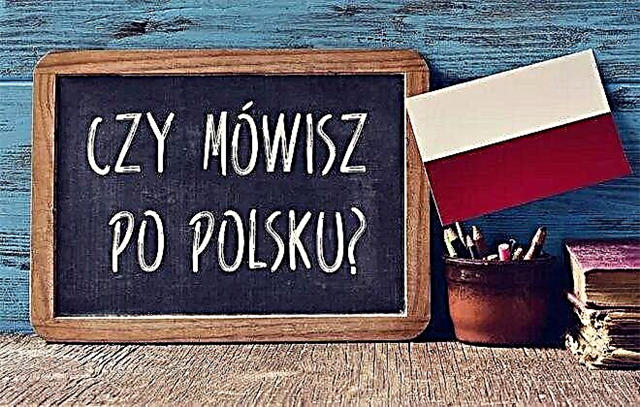Poland has gone through a difficult historical path of development, therefore, various European dialects can be found on its language map. Only after World War II did the Polish Republic become a mono-ethnic state. But on the territory of the country today you can hear other languages of Poland: dialectal Silesian and Kashubian, languages of neighboring countries - Russian, Ukrainian, Lithuanian. At the same time, the overwhelming majority of the population calls it Polish as their native language.

A bit of history
Experts attribute the Polish language to the West Slavic group, which arose about two thousand years ago; but at that time the population of modern Poland spoke different dialects. Gradually, the differences between them were erased, a single dialect began to form. For a long time it was popular only among the people - the Poles compiled the chronicles in Latin.
The history of the Polish language actually begins in the 16th century, when the first books were written, spelling rules were formulated.
The flourishing of the literary Polish language began in the 19th century. The appearance of such writers as A. Mickiewicz, E. Ozheshko, G. Sienkiewicz drew attention to the literature of Poland, its language. At the same time, the very territory of the country was divided at that time between Russia, Austria-Hungary, Prussia. Accordingly, therefore, a significant part of the population spoke Russian, German, Lithuanian, as well as Yiddish, which was a popular means of communication.
After the end of the First World War, the Poles created an independent state, the process of transition to a single linguistic norm began. Today, the state language of Poland is Polish; it is spoken by about 40 million people in the republic and other countries of the world.
Equal among European languages
Despite the complex history of the formation of statehood, disagreements and problems that arose over several centuries, in the end, an ethnic majority was created in this Eastern European country, which developed for itself a single means of communication.

The national language of Poland was formed mainly on the basis of Lesser and Greater Poland, Mazovian dialects, the differences between which are today leveled. It was slightly less influenced by Kashubian and Silesian, which still retain their identity.
Since the country's accession to the European Union, Polish has been one of the means of communication in the EU, according to the latest census, almost 37 million inhabitants of the country speak Polish.
This is the official language of Poland, which is spoken by almost all residents of the country.
At the same time, there are many ethnic minorities in the republic who choose other language options - about a million people.
Regional dialects and adverbs
Almost half a million people in Poland speak the Silesian dialect, which is a cross between Czech and Polish. The main territory of its distribution is the settlements of Upper Silesia.
The Kashubian language, common in Pomerania, in the Gdansk region, is officially recognized as the country's only regional means of communication. The Kashubian dialect is close to Polish, but, for historical reasons, there are many borrowings from Old Russian and German.
According to various estimates, from 100 to 500 thousand people speak Kashubian, although in the last census the number of those who consider it to be their native language is slightly more than 100 thousand inhabitants of the region.
Languages of other peoples in the Polish Republic
If we find out further what language is spoken in Poland, then we must also indicate the means of communication between representatives of other nations and peoples who have settled in the country.
Today in the republic they speak Belarusian, Ukrainian, Czech, German, Russian, Lithuanian, Armenian, Yiddish are widespread.
In large cities - Warsaw, Krakow, Wroclaw, Gdansk - there are large diasporas that create national Sunday schools, develop and maintain their language traditions.
The most common foreign languages in Poland are Belarusian, Russian, German.
Belorussian
Historical indications have survived to the fact that even in the Grand Duchy of Lithuania, Polish was used by the gentry, and the Belarusian language was considered a peasant dialect. Today about 50 thousand Belarusians live in the Republic of Poland, 40 thousand of them use their native language in everyday life.
Almost 97% of Belarusians live in the Podlaskie Voivodeship, located directly at the border with Belarus. They make up a fifth of the total population there, which is why most of the voivodeship's residents are bilingual.
Russian
Russians often wonder if they speak Russian in Poland. Along with the common in Europe English and German, Russian is widely studied in schools and universities. This is largely due to economic reasons, growing business ties between the two countries.

Since in the time of the USSR, Russian was compulsory for learning, the majority of middle-aged and older Poles are fluent in it.
In recent years, interest in the Russian language has been growing, many courses and schools have appeared in which it is studied. At the same time, there are not so many Russian-speaking residents in the country - about 13-15 thousand. For many of the settlers who appeared here in the 18th and 20th centuries, the native language in Poland is Polish.
German
According to the latest census, approximately 150-200 thousand inhabitants of the country indicate their nationality in the corresponding column as Germans, most of them speak German among themselves.
According to the prevailing historical circumstances, the German-speaking population lives compactly in Upper Silesia and Pomerania. It was here that the German language became most widespread, in fact, it became regional. Many people use it to communicate in shops, on the streets, and you can contact local authorities on it.
In addition, German is studied as a foreign language in schools and universities in Poland. You can often meet people who speak German on the streets of Polish cities.
Conclusion
The answer to the question of which language is considered the main one in Poland will not be difficult for the inhabitants of the country - of course, Polish. At the same time, the authorities and the population of the country are tolerant of the speakers of other linguistic cultures. There are opportunities for the creation of Sunday schools, national associations that help preserve their traditions and native language.
In places of compact residence of people of other nationalities, you can hear their speech on the streets. Government officials are required to understand the local language and use it in communication.











